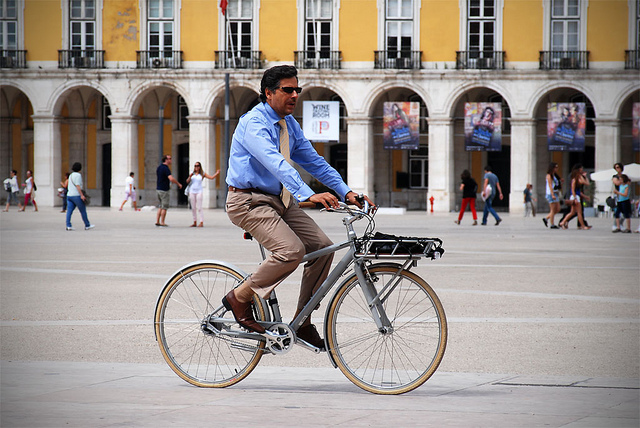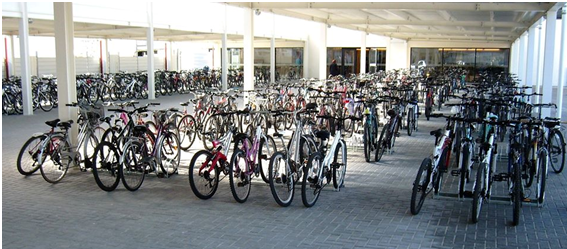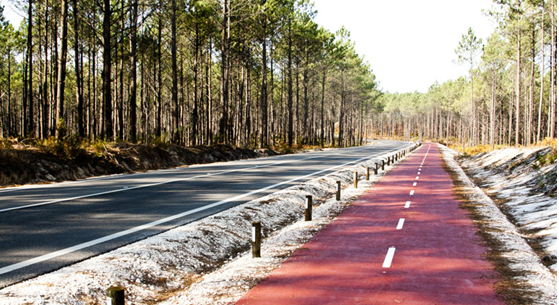
Portugal's Silent Pedal Revolution
MP Pedro Roque Oliveira commuting to work in downtown Lisbon (C: Lisbon Cycle Chic)
Last week the growing Portuguese bicycle cluster gathered at the University of Aveiro (UA) where Professor José Carlos Mota and the national bicycle industry representative, Paulo Monteiro Rodrigues, coordinated various panels, joining Portugal's bicycle planning specialists, the three national cycling associations (FPC – sports, FPCUB - cycletourism and cyslists, and MUBi - urban bicycle mobility), university researchers, national greenway and infrastructure authorities, municipal technicians, mayors, software and APP designers, industry and bicycle designers, the cycletourism sector, micrologistics operators, and product specialists. The result was an enriching discussion including a series of conclusions and objectives defined for the near future. Despite the lagging public sector, some important municipal infrastructural measures regarding traffic calming and local bike-way networks are currently underway; 2016 and 2017 may well be Portugal's turning point - the long awaited pedal revolution of Europe's west coast. In fact, Portugal’s pedal revolution has already started to take shape in the non-public sectors, silently but steadily, and will surely become even more noticeable in the near future. Despite the major lag of attention from most local politicians (epitomized by the mayor of Oeiras' fight against the population's desire for a coastal "Ciclovia na Marginal" bike-way), bicycle use is growing exponentially amongst the population, especially in urban areas. Important activities are gaining ground, such as the Cicloficina community meetings, where bicycle parts and small repairs are voluntarily performed at 12 locations nationwide, 9 in the Lisbon area alone. Critical Mass has expanded to 14 cities and towns nationwide, and other programs organized by MUBi, FPC and FPCUB have also been working towards a greater number of people cycling for mobility, with programs such as MUBi's Bike Buddy, Bike to School and Sexta de Bicicleta; FPC’s Ciclismo para Todos , and FPCUB’s Combinado to promote intermodality between bicycles and public transport and to replace car-use in daily mobility in the large sprawled metro areas.
 Secondary school at Gafanha da Nazaré where 80% of students bike to school (C: Agrupamento de Escolas da Gafanha da Nazaré)
Secondary school at Gafanha da Nazaré where 80% of students bike to school (C: Agrupamento de Escolas da Gafanha da Nazaré)
Besides the focal points at the heart of the large metropolitan areas of Porto and Lisbon which together represent over 40% of the country's 10,6 million inhabitants, a strong bicycle cluster in the Aveiro region is positioning itself to become a benchmark for the country: this region of 11 municipalities and 370,000 inhabitants has the nation’s highest bicycle use modal share (between 10% and 17% of commuter trips, depending on the municipality). Aveiro is also home of the University of Aveiro and the ABIMOTA research programmes and facilities and, above all, a "bikes mean business" approach among the various industry stakeholders in the region, employing over 2,500 people and exporting €315 million annually in bicycles and bicycle parts. Most municipalities still lack proper cycling infrastructure, even near Aveiro, but Murtosa district is a notable exception, and regional operations such as the local bike-share schemes (some in operation since the late 1990's), and the CicloRia bikeway network have provided some improvements to bikeability in Aveiro's urban areas and the connection between these and other major local sights such as coastal villages, beaches, dune areas, wetlands, woods and campgrounds. On a national level, an important comprehensive cycletourism guide covering most of the mainland, Ecovias de Portugal, was launched for the first time this Summer. This guide provides a new perspective on existing trails, with an organized schedule for further developments and an APP for subscribers. A competition by the Vodafone Foundation for smart cities also attributed first prize to Lisboa Horizontal, a smartphone route-planning APP developed for urban cyclists who want to choose the flattest routes with lowest traffic or search for other useful data such as bicycle shops, bikeways, bicycle parking, public transport locations, etc. The APP is extremely simple to use and should be replicated to other cities. Route data may be compiled for use by interested services, such as planners and municipal traffic management departments which may come in handy as the insufficient networks grow to meet demand. A national network of bicycle-friendly hotels was also established recently, Bikotel already has 68 bike-friendly hotels certified with various support services for cyclists and bicycles. Another 20 certifications are already underway, and further expansion is planned for complete national coverage considering a 40km bikeable distance between accommodations.
 Bicycle path through the Leiria coastal forest where EuroVelo 1 - The Atlantic Coast Route is proposed to pass between Aveiro and Lisbon (C: Pedro Sena)
Bicycle path through the Leiria coastal forest where EuroVelo 1 - The Atlantic Coast Route is proposed to pass between Aveiro and Lisbon (C: Pedro Sena)
The expected approval of the EuroVelo EV1 Atlantic Coast Route could be an important symbolical link between all of Portugal's most important bicycle culture nesting grounds: it passes by the city of Porto connecting its metro area directly to the bicycle manufacturing hub in the Aveiro region, and South to the large Lisbon metro area, where activism is high and the municipality has committed to implementing a large bike-share program and to doubling the existing bicycle network before 2017. From Lisbon, EV1 follows the wild coastline to Algarve, one of Europe's top tourism destinations for both sports and leisure cycling, where bicycle modal share is also above the national average. Keep an eye on Portugal!
About the author  Bernardo Pereira is an architect and cycling expert who has been active in many active mobility urban projects.
Bernardo Pereira is an architect and cycling expert who has been active in many active mobility urban projects.
Regions:
News category:
- Log in to post comments
Contact the author
Recent news!
Upcoming events
Contact Us
Avenue des Arts, 7-8
Postal address: Rue de la Charité, 22
1210 Brussels, Belgium









